|
|
|
Sort Order |
|
|
|
Items / Page
|
|
|
|
|
|
|
| Srl | Item |
| 1 |
ID:
085116
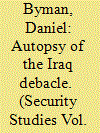

|
|
|
|
|
| Publication |
2008.
|
| Summary/Abstract |
This article examines whether the outbreak of an insurgency after the U.S. invasion of Iraq was an avoidable policy failure or whether the structural conditions surrounding the occupation made such an outbreak inevitable. Several U.S. policy mistakes, in particular the deployment of too few troops, a lack of comprehensive political and military planning for the occupation, disbanding the Iraqi military, the failure to establish a government in waiting, and overly aggressive de-Baathification, greatly exacerbated rather than ameliorated the various structural problems. More fundamentally, structure and policy choices interacted at all levels to explain the Iraq failure. The unavoidable conditions that coalition forces encountered in Iraq-a divided society devastated by years of war, sanctions, and misrule-and the political context in the United States made the challenge for successful policy execution difficult. This structure constrained and delimited the options open to U.S. policy makers but, even within those narrow limits, the United States made many bad choices that further diminished the chances of success.
A particularly important series of policy mistakes occurred well in advance of the buildup to war itself. The orientation of the U.S. armed forces away from counterinsurgency, the failure to establish a political settlement before invasion, and other controllable policy choices in the prewar period all led to enormous difficulties during the occupation itself. Thus, by the time of the invasion, these policy choices had become almost like structural constraints and the failures had a snowballing effect, making policy corrections far more difficult.
|
|
|
|
|
|
|
|
|
|
|
|
|
|
|
|
| 2 |
ID:
085122
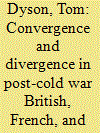

|
|
|
|
|
| Publication |
2008.
|
| Summary/Abstract |
Post-Cold War military reforms in Britain, France, and Germany have been characterized by patterns of convergence in the objectives, instruments, and institutional forums of defense policy but by divergence in temporality. These patterns of convergence and divergence cannot be fully explained by cultural approaches. Neither can they be explained solely by a focus on the role of international structure, as neo-realism posits, although the post-Cold War distribution of capabilities is driving Britain, France, and Germany toward policy convergence. Instead, the analysis builds upon the insights of neoclassical realism. Culture emerges not so much as a cause of action as instrumental and a resource for policy leaders in the domestic political and temporal management of reform.
|
|
|
|
|
|
|
|
|
|
|
|
|
|
|
|
| 3 |
ID:
085126
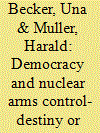

|
|
|
|
|
| Publication |
2008.
|
| Summary/Abstract |
Is there a particularly democratic way of dealing with nuclear arms control? Against the background of democratic peace (DP) theory, and using Immanuel Kant's writing as a starting point, this article argues that democracies should indeed develop a preference for arms control, but that Liberalism as well as the nature of nuclear weapons opens the possibility for contingent developments within a DP framework. While DP theory can thus account for the existence of variance, we maintain that a social constructivist complement based on role, identity, and enemy perception can best explain why a given democracy follows a specific path. Case studies of six Western democracies reveal a considerable variance in their nuclear arms control policies, which can indeed be traced back to the countries' respective roles, identities, and images of the Kantian "unjust enemy."
|
|
|
|
|
|
|
|
|
|
|
|
|
|
|
|
| 4 |
ID:
085117


|
|
|
|
|
| Publication |
2008.
|
| Summary/Abstract |
The inability of the United States to capture or kill Osama bin Laden and many of his top deputies at Tora Bora is widely recognized as one of the most significant missed opportunities of America's struggle with al Qaeda. However, the debate over U.S. actions at Tora Bora during Operation Enduring Freedom lacks in-depth analysis, especially concerning the commonly offered solution of more U.S. troops on the ground. This paper dissects the original operation against al Qaeda forces entrenched in the mountain complex in eastern Afghanistan in late 2001 and its impact on the debate over the Afghan model of warfare. An alternative plan involving U.S. conventional forces is presented that takes into account the considerable constraints of the scenario and analyzes the key make-or-break points of the operation. Although the challenges are far greater than most critics have allowed, the revised plan would likely have offered the best chance to capture or kill Bin Laden and a significant portion of the al Qaeda leadership.
|
|
|
|
|
|
|
|
|
|
|
|
|
|
|
|
| 5 |
ID:
085125
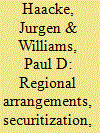

|
|
|
|
|
| Publication |
2008.
|
| Summary/Abstract |
This article seeks to contribute to debates about how regional arrangements construct and respond to threat agendas. It does so by using the literature on the concept of securitization to explore the processes through which the African Union (AU) and the Association of Southeast Asian Nations (ASEAN) have dealt with contemporary transnational challenges. After providing an overview of the Copenhagen School's (CS) understanding of securitization, we examine the main problems and limitations that emerge when attempting to apply the concept of securitization to regional arrangements in the developing world. The article explores in particular the extent to which the AU and ASEAN have securitized the transnational challenges on their agendas. We conclude that in both cases the impact of security culture as well as unresolved conceptual and methodological issues raise significant questions when seeking to apply securitization theory outside of Europe.
|
|
|
|
|
|
|
|
|
|
|
|
|
|
|
|
| 6 |
ID:
085120
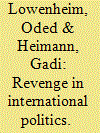

|
|
|
|
|
| Publication |
2008.
|
| Summary/Abstract |
This paper conceptualizes the phenomenon of revenge in international politics and seeks to specify the conditions that increase or diminish the tendency of states to take revenge against enemies. We situate the discussion of revenge within the broader context of emotions in IR. We argue that whether or not a state will take revenge depends on the combinations of three interrelated and mutually constitutive variables: (1) the degree to which a state emotionally experiences harm against it as morally outrageous, (2) the extent of humiliation the harmed state feels, and (3) the degree to which international retaliation is institutionalized by rules and laws that govern the use of cross-border force. We examine the Second Lebanon War (July 2006) as a case of revenge in international politics.
|
|
|
|
|
|
|
|
|
|
|
|
|
|
|
|
|
|
|
|
|